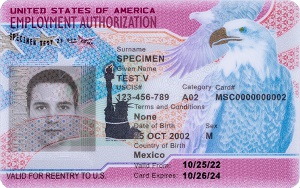
Unauthorized employment in the United States can complicate the process of adjusting your status to become a lawful permanent resident (green card holder). However, certain exceptions exist that may allow you to proceed with your application despite past unauthorized employment. Understanding these nuances is crucial to navigating the immigration system successfully.
Unauthorized Employment, Explained
Unauthorized employment refers to any work performed for an employer in the U.S. by a foreign national who is not authorized by the Immigration and Nationality Act (INA) or U.S. Citizenship and Immigration Services (USCIS) to accept employment, or who exceeds the scope or period of their employment authorization. That's according to USCIS.
In more simple terms, noncitizens must have permission to work in the United States. Therefore, if you are a foreign national who is working in the United States, it is like unauthorized employment if you do not have:
- Nonimmigrant Employment-based Visa: Some temporary visas are designed for foreign workers. Examples include H-1B, L1, and TN status.
- Employment Authorization Card: Certain individuals like asylees, refugees, DACA recipients, and adjustment of status applicants may apply for a work permit, known officially as an employment authorization document (EAD); or
- Permanent resident status: Also known as a green card holders, permanent residents have the right to accept employment in the U.S.
It's important to note that even unpaid work can sometimes be considered unauthorized employment. Genuine volunteer work is generally permissible. However, if the unpaid work is typically a paid position or provides some form of compensation, it may be viewed as unauthorized. Consulting with an immigration attorney can help clarify your specific situation.
Bars to Adjustment of Status Due to Unauthorized Employment
U.S. immigration law outlines specific bars that can prevent individuals from adjusting their status if they have engaged in unauthorized employment:
- INA 245(c)(2): This provision bars adjustment of status for individuals who have engaged in unauthorized employment before filing their adjustment application (Form I-485).
- INA 245(c)(8): This provision bars adjustment of status for individuals who have ever engaged in unauthorized employment, whether before or after filing their adjustment application.
These bars apply regardless of when the unauthorized employment occurred. USCIS officers may review your entire U.S. employment history to determine if any unauthorized work was performed.
Exceptions to the Bars
Some green card applicants can still adjust status despite unauthorized employment. Immediate relatives of U.S. citizens and certain special categories are exempt from these bars. Understanding these exceptions can help you determine if you qualify.
- Immediate Relatives of U.S. Citizens: This includes spouses, unmarried children under 21, and parents of U.S. citizens. For these individuals, unauthorized employment does not prevent adjustment of status.
- Other Exempt Categories: Applicants under the Violence Against Women Act (VAWA), certain physicians, certain international organization employees and their family members, special immigrant juveniles, and certain members of the U.S. armed forces and their families are also exempt from these bars.
Section 245(k) Exception
For certain employment-based green card applicants (specifically those in the EB-1, EB-2, EB-3, and religious worker categories), Section 245(k) provides an exception. This allows adjustment of status if the applicant:
- Was lawfully admitted to the U.S.;
- Has not engaged in unauthorized employment for more than 180 days in aggregate; and
- Has not otherwise violated the terms of their status for more than 180 days.
Accurately documenting periods of unauthorized employment and maintaining thorough records is essential for applicants seeking this exception.
Employment Authorization During Adjustment Process
Filing Form I-485, Application to Adjust Status, does not automatically grant employment authorization. To work legally while your application is pending, you must file Form I-765, Application for Employment Authorization, and receive an Employment Authorization Document (EAD). Working without this authorization can be considered unauthorized employment and may negatively impact your application.

Certain employment-based nonimmigrants such as H-1B or TN may not require the EAD. Their visa status provides employment authorization. But applying for the EAD concurrently with Form I-485 is generally very practical because:
- An EAD allows the AOS applicant to work for virtually any employer; and
- The employment visa may expire while waiting for a green card.
While unauthorized employment can pose significant challenges to adjusting status, understanding the exceptions and properly navigating the application process can lead to a successful outcome. It's crucial to be aware of the specific provisions that may apply to your situation and to seek professional guidance when necessary.
How CitizenPath Can Assist
It's our job to help make sure USCIS approves your green card.
CitizenPath provides simple, affordable, step-by-step guidance through USCIS immigration applications. Individuals, attorneys and non-profits use the service on desktop or mobile device to prepare immigration forms accurately, avoiding costly delays. CitizenPath allows users to try the service for free and provides a 100% money-back guarantee that USCIS will approve the application or petition. We provide support for the Adjustment of Status Package (Form I-485), Employment Authorization Package (Form I-765), and several other USCIS forms.
Want more immigration tips and how-to information for your family?
Sign up for CitizenPath’s FREE immigration newsletter and
SAVE 10%
on our immigration services






